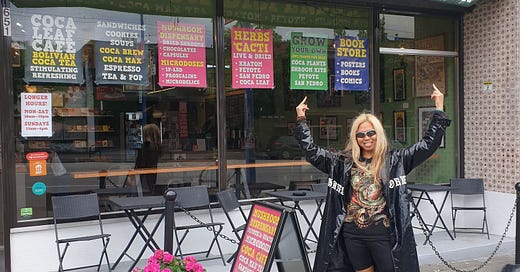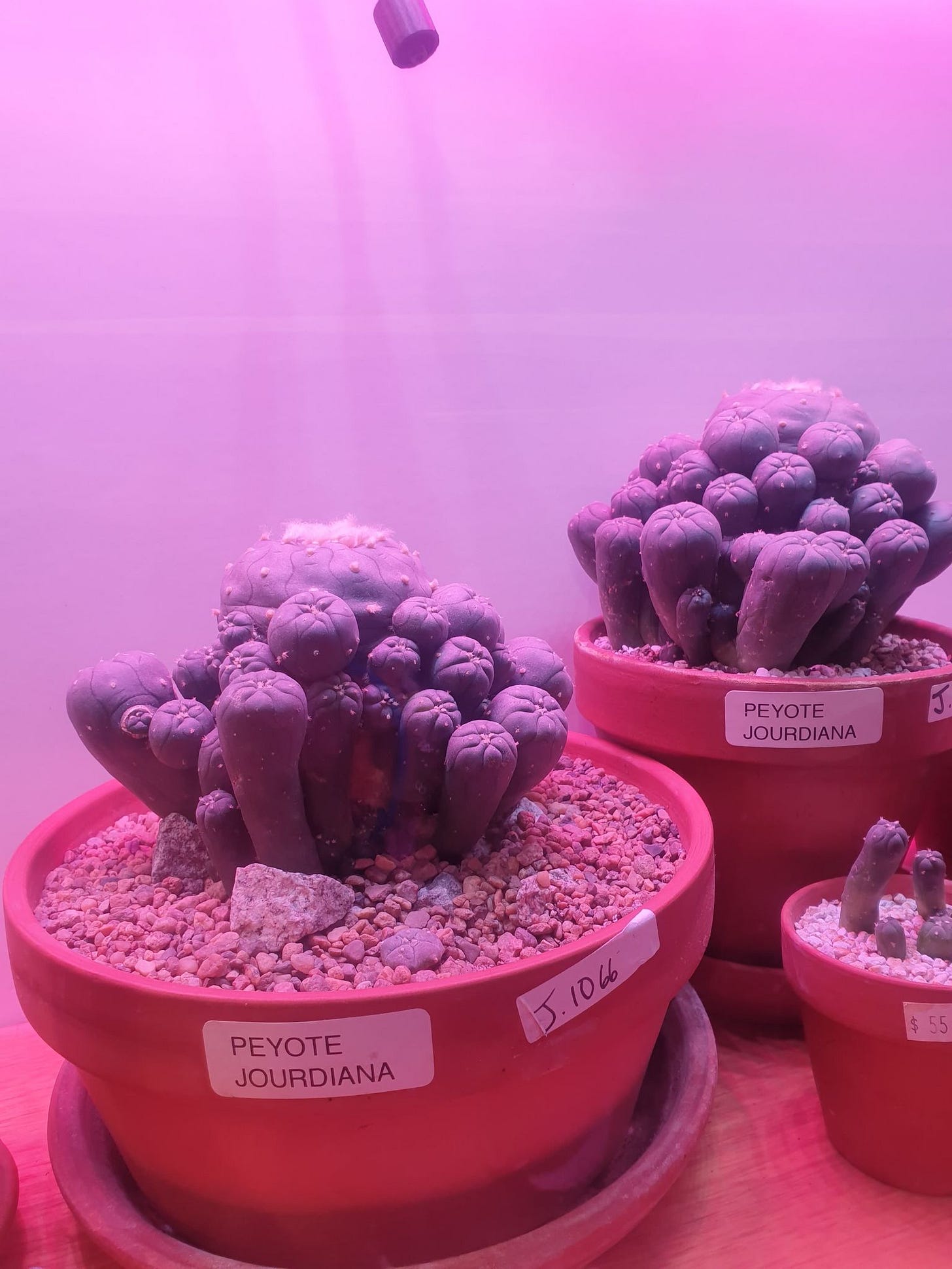I hauled ass to the shroom dispensary like a pilgrim fearful that mecca might be a mirage. Psychedelics are illegal in Canada, but blackmarket shroom shops have been popping up all over Vancouver, a city known for always being a little ahead of the drug curve. Who are these crazy mfckers flouting the law with surreal audacity—filling a gap in the market while conjuring a fabulous future on the brink of possibility?
Obviously, I was going to find out.
It took five delirious days to drive from Los Angeles to Vancouver—five days fueled by Bang energy drinks, designer amphetamines, and DJ mixes plucked from deep in the 90s Dallas underground. It was late when we finally pulled up, clocking the shop by the bright green banner shimmering across its eaves like a hallucination:
MUSHROOM DISPENSARY
MICRODOSES - COCA TEA - KRATOM - PEYOTE - SHROOM KITS
Umm… excuse me?!
The shroom store closed in five minutes. Shit, couldn’t find parking. So we just double-parked and galloped through the doors, panting. Dude named David behind the counter laughed, said he’d keep the store open for us (heads recognize heads!). Thank god, because the spot was INSANE.
Girls, let me tell you that reading the news reports does not prepare you for the frisson of beholding a shroom dispensary in person—the shuddering thrill of standing at the edge of new frontier as it unfolds in real time. Sure, this isn’t the first shroom dispensary in the world—there are several “smart shops” in Amsterdam selling truffles to endless tourists—but I’ll explain in an upcoming post why the famous Dutch tolerance towards drugs is declining. In the US, there is also a psychedelic church called Zide Door that functions as a de-facto shroom dispensary—but it’s battling legal issues and is even suing Oakland’s police department.
This spot, however, hit different.
Let’s start with the fact that the shroom store was also a cocaine cafe—or rather, sold drinks brewed with Erythroxylum coca, the South American plant that coke comes from.
In fact, the shroom shop is actually called The Coca Leaf Café—and coca just as much a star of the show. After railing two cold-brew teas, I found coca to be way less tweaky than cocaine, but with an exquisite euphoria that made it feel closer to amphetamines than caffeine. (I also copped a bunch of coca gum for later that night, when I hit a cute club called Paradise to see Mike Servito play… let me just say that shit is God’s gift to ravers…)
Coca plants are illegal to own/grow/sell in both Canada and the US, and this shroom shop claims to be the only place where they’re sold over-the-counter. It’s no surprise that the War on Drugs’ clumsy policies overlook the plant’s indigenous ethnohistory, and how it is still used in South American/Andean societies for everything from ceremonial rituals to combating altitude sickness and everyday productivity boosts. Even the pope was sippin coca tea during a trip to Bolivia in 2015…
Of course, the shop also sold a nice variety of dried shrooms—stocking classics like Golden Teacher ($28/eighth), rarer strains like Trinity and Blue Meanies ($35/eighth), as well as microdose capsules and chocolates.
But what really got me off were the veritable psychedelicacies on offer: DMT vapes, bottles of LSD and 1P-LSD, sugar cubes dosed with psilocybin, microdosed shots of peyote analog proscaline, and some of the prettiest peyote buttons we’d ever seen.
I mean, this place was CARRYING….
The next day, I came back to the shroom shop to chat with its owner Dana Larsen—a fast-talking buccaneer and former cannabis journalist with deep roots in the city’s drug activism scene. I was trying to understand what structural conditions were allowing shroom dispensaries to flourish in Vancouver with little police intervention—and whether this phenomenon could one day be replicated elsewhere.
Vancouver has long been a political battleground for progressive drug policies: the first safe-injection site in North America opened here in 2003, the government currently sponsors pharmaceutical-grade fentanyl at fentanyl dispensaries (!), and local activist group Drug User Liberation Network made waves earlier this year for giving away free heroin, crack, and meth on the streets to addicts. In 2023, the city will begin an experimental program where hard drugs (meth, crack, heroin, opioids) will be decriminalized for three years, as part of a pilot program in British Columbia.
“The first anti-drug laws started in Vancouver with opium, and it’s been the focal point of prohibition ever since,” began Larsen, taking a seat at a cafe table and offering me a steaming cup of Cocaccino. “It took 30 years [of activism] for cannabis legalization, and I estimate it’ll be 10 years for recreational mushrooms.”
Larsen told me he opened Vancouver’s third cannabis dispensary back in the day, and that a portion of his weed and shroom sales go towards funding a harm reduction center down the street called Get Your Drugs Tested. Underground dispensaries have always been instrumental to the drug legalization movement by providing access to and normalizing the use of these substances, he continued. “A lot of the same people and legal arguments behind cannabis are now fighting for mushrooms,” he said. “People want to use [these substances] but there’s nowhere to buy it, so dispensaries stepped up.”
Dana Larsen, owner of the Coca Leaf Cafe in Vancouver
While there are a dozen other shroom dispensaries in Vancouver, Larsen is currently the only shop owner willing to come forward and talk to press. He says his visibility is strategic—as an established cannabis activist, he’s already made a name for himself as a leader in Canada’s anti-prohibition movement. “I’m pushing boundaries because of my unique position to open a shop like this,” he said. “I think that putting my face on it gives me more protection, not less.” (I visited another shroom shop called Zoomers later that day, and the shop worker uneasily told me that it was owned by a “medical collective,” refusing to give other details.)
Larsen said he expects hundreds more shroom dispensaries will open across Canada in coming years, noting that while there are significant risks (like uh, getting raided), there is also a lot of potential revenue in this kind of business due to soaring public demand. “There’s a lot of interest, and buying shrooms over mail-order can feel sketchy,” he said. “Plus, this is the only shop where you could return a faulty DMT pen.”
For now, Larsen’s Coca Leaf Cafe remains operational—but its future remains uncertain. About a month ago, he received a letter from city officials claiming that his shop was selling mushrooms out of the back without a business license. “I believe other shroom shops in Vancouver have also gotten letters and threats about operating without a license,” he said.
However, the Coca Leaf Cafe does have a license—as a food business.
“Since we have a license, our legal situation is a bit different and may play out differently in court,” Larsen mused. “Normalization happens first—laws and bylaws follow, and get changed after the fact.”
The sun was starting to set, and it was time for me to get back on the road for my next stops: an anarchist gathering in the Oregon wilderness called Autonomous Mutant Fest, and a psychedelic music festival in Ojai hosted by Double Blind Magazine. So I shook Larsen’s hand, and told him that I hoped to return to his shroom shop in a near future when psychedelics are legalized, and he’s seen as a pioneer in the game.
His answer surprised me: “I’m not interested in having a legal shop, because I couldn’t get a license doing what I’m doing, selling LSD, DMT, etc,” he said. “One day I’d even like to provide clean heroin.” He paused, and smiled at my shocked reaction.
“In a way, I’m working against my own profit interest because I could go out of business under legalization,” he concluded. “But I’m more comfortable at the cutting edge.”










this story runs it. i wasn't apprised of the canadian market to this degree.
as an oakland (huichin territory) resident, I've been familiar w/ and a part of the movement for years (current cannabis industry professional).
I appreciate the opportunity to learn about the different drug / access cultures through this blog.
thanks for sharing!
😍🤤😍